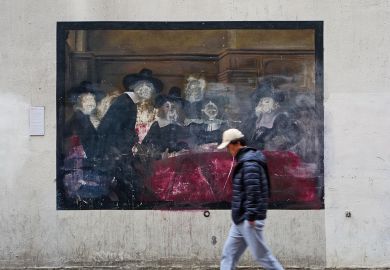Three stories reported recently in Times Higher Education illustrate a worrying trend in the attitude of the Government and its agencies and servants towards the academic community - or, more accurately, a worrying escalation in a trend observable over the past decade or so.
In his annual allocation letter to the Higher Education Funding Council for England, John Denham, the Universities Secretary, ruled that the publicly funded institutions must accept "cultural change". "Providers," he warned, must "provide and adapt courses swiftly in response to demand" from employers. Businesses, he signalled, are set to become much more heavily involved in setting "the agenda".
Mr Denham was also reported as having weighed into the debate about the future of research assessment funding. Addressing the Royal Society for Arts, Mr Denham pre-empted the outcome of a Hefce consultation by indicating that in future he expects university research assessment exercises (by whatever name they are called) to judge scientific research with reference to the extent to which scientists "produce excellent evidence and advice in the national interest".
Meanwhile, Sir David King, who has just retired as the Government's Chief Scientific Adviser, launched an attack on us teachers in the humanities for failing to engage with climate change. Apparently, we non-scientists are refusing to work in an "interdisciplinary mode". We need to emerge, or be forced to emerge, from our "comfort zones" to play our part (whatever that is) in tackling the global-warming problem.
How is this going to be done? The financial demands made by the humanities in terms of research funding are minuscule compared with those made by the "heavy metal" sciences. Still, it might be no bad thing - from Sir David's point of view - if, in future, applicants to the Arts and Humanities Research Council were obliged to indicate how their proposed research dovetailed with the requirement to tackle global warming: Disraeli (or Bismarck) and Global Warming; Global Warming during the Puritan Revolution; Global Warming as evidenced in the Hegelian Dialectic - that sort of thing.
Indeed, I shall not be at all surprised if we reach the stage at which humanities research funding applications that do not engage with global warming are returned for rewriting. Meanwhile, subject benchmark statements in humanities and social science disciplines will no doubt be revised so as to include suitable desiderata of the global-warming kind, and the Quality Assurance Agency can no doubt be cajoled into requiring its inspectors to audit adherence to such revised statements as they do their rounds.
Mr Denham's intention to rewrite the academic definition of research looks on the face of it a more problematic hurdle to jump. But he who pays the piper has a habit of being able to call the tune. It is true that, in his instructions to Hefce, Mr Denham omitted to define what "the national interest" actually is, and how the funding council might measure it. But in my experience, as a teacher of politics, "the national interest" is whatever the Government of the day says it is. Mr Denham and his successors can therefore be expected to tell us - or rather, Hefce - what constitutes the national interest, and Hefce, as the Government's loyal servant, will doubtless convey this edict without demur to those who design and implement the research excellence framework that will replace the research assessment exercise in five years' time. In effect, the Cabinet will, in this way, determine to an unprecedented extent the outcome of the REF. Judgment by academic peers will be replaced by the judgment of the party in power at the time.
And so to business, or rather to the role of business in setting "the agenda". On the face of it, there seems nothing remarkable about this. Most graduates are not going to become university teachers. They will enter other employments, and they need the skills that will enable them to do so. In many disciplines the teaching curriculum is already heavily influenced by the needs of employers and the expectations of employment. But in his funding allocation letter, Mr Denham went much further than this. He is clearly working towards (as he put it) "a new relationship" between employers and higher education, in which it will be the employers who call the shots and the academics who respond "swiftly" to their demands.
As Gladstone said as he contemplated the Irish (climate change) question: "The future is dark and I am perturbed."
Geoffrey Alderman is Michael Gross professor of politics and contemporary history at the University of Buckingham
Register to continue
Why register?
- Registration is free and only takes a moment
- Once registered, you can read 3 articles a month
- Sign up for our newsletter
Subscribe
Or subscribe for unlimited access to:
- Unlimited access to news, views, insights & reviews
- Digital editions
- Digital access to THE’s university and college rankings analysis
Already registered or a current subscriber? Login



